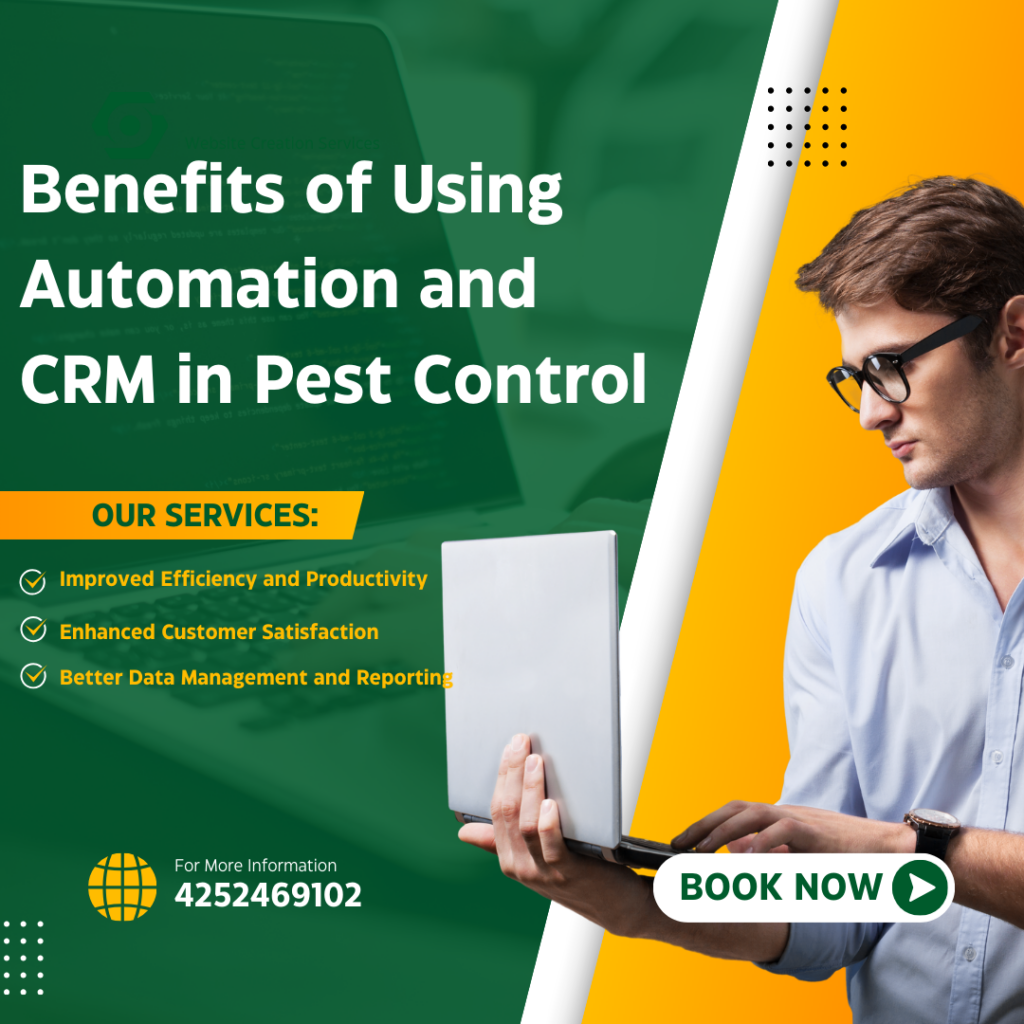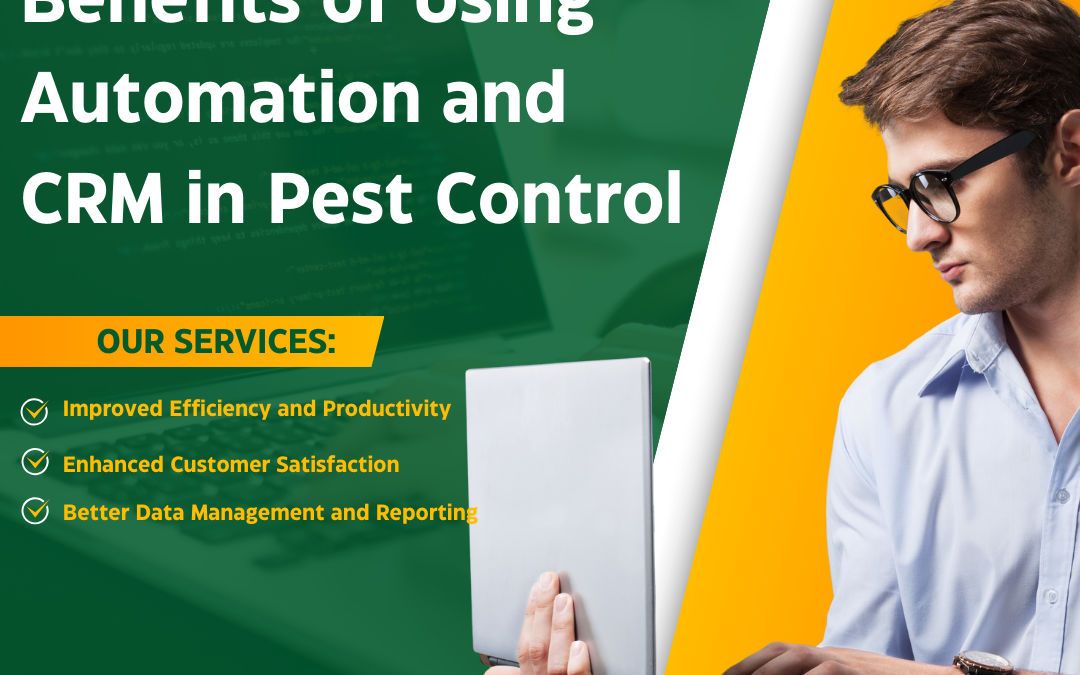Running a pest control business in today’s competitive market can be challenging, but also rewarding. With the demand for pest management growing, scalability has become essential for businesses that want to stay competitive and profitable. This is where automation and CRM (Customer Relationship Management) systems come in. By leveraging these tools, pest control companies can streamline their operations, improve customer experiences, and grow their market reach.
Understanding the Need for Automation in Pest Control
What Is Automation?
Automation is the process of using technology to perform tasks with minimal human intervention. For a pest control business, automation can mean anything from scheduling and dispatching technicians to automating customer communications and reporting.
Why Pest Control Businesses Should Consider Automation
Automation offers pest control companies a range of benefits, including time savings, improved efficiency, and reduced errors. By automating repetitive tasks, businesses can free up their staff to focus on higher-value activities, such as customer support and strategic planning.
Common Tasks That Can Be Automated in Pest Control
In pest control, some of the most common automated tasks include scheduling appointments, sending reminders to customers, invoicing, and managing follow-ups. Automation can even streamline inventory management by automatically reordering supplies when stock runs low.
What Is a CRM System and Why Is It Essential?
Defining CRM in Simple Terms
A CRM, or Customer Relationship Management system, is a software tool that helps businesses manage their interactions with current and potential customers. For pest control companies, CRM systems store customer information, track service histories, and streamline communication.
Key Benefits of CRM Systems for Pest Control Businesses
CRM systems are invaluable for maintaining organized records, managing customer relationships, and identifying potential business opportunities. They help companies stay connected with customers, improve service quality, and increase customer satisfaction.
How CRM Supports Customer Relationships and Business Growth
With CRM, pest control businesses can personalize their interactions, leading to stronger relationships. By tracking each customer’s preferences and needs, companies can offer tailored services, which fosters loyalty and promotes repeat business.
Key Automation Tools for Pest Control Businesses
Software Solutions for Scheduling and Dispatch
Scheduling and dispatch software tools are essential for organizing routes efficiently. By optimizing technician schedules, businesses can reduce travel time, lower fuel costs, and ensure timely service delivery.
Tools for Automated Customer Communication
Automated communication tools enable companies to send appointment confirmations, reminders, and follow-up messages, keeping customers informed and engaged without manual intervention.
Field Service Management Tools
Field service management (FSM) tools track technician locations, manage job details, and provide updates in real-time. This ensures smooth operations in the field and helps improve response times and customer satisfaction.
Benefits of Using Automation and CRM in Pest Control

Improved Efficiency and Productivity
By automating scheduling, invoicing, and customer follow-ups, businesses can save hours of work each week, allowing staff to focus on tasks that add more value.
Enhanced Customer Satisfaction
Automated systems ensure timely communication and streamlined service, which leads to better customer experiences. Satisfied customers are more likely to refer your business, driving growth through word of mouth.
Better Data Management and Reporting
With CRM, pest control businesses can store customer information and track service records, making it easier to analyze data, measure performance, and adjust strategies based on real insights.
How to Choose the Right CRM System for Your Pest Control Business
Factors to Consider When Choosing a CRM
Selecting a CRM requires considering factors like budget, ease of use, scalability, and compatibility with other software.
Top CRM Features for Pest Control Businesses
Look for CRM features like scheduling, customer data storage, automated follow-ups, and integration capabilities with field service tools.
Popular CRM Options for Small to Mid-Sized Pest Control Businesses
Some well-known CRM options for pest control include Jobber, GorillaDesk, and Housecall Pro, each offering unique features suited for small to mid-sized companies.
Integrating CRM with Other Automation Tools
How to Integrate CRM with Scheduling Software
Integrating CRM with scheduling software helps businesses maintain a seamless workflow by syncing appointment data and customer information.
Synchronizing CRM with Marketing Automation
When CRM is integrated with marketing automation tools, companies can send targeted promotions to customers, generating repeat business and increasing revenue.
Building a Seamless Workflow with CRM Integration
A well-integrated CRM system creates an efficient ecosystem where data flows smoothly between different tools, eliminating the need for manual data entry and reducing errors.
Setting Up and Implementing Automation for Daily Operations
Step-by-Step Guide to Setting Up Automated Scheduling
Automated scheduling systems allow pest control businesses to manage appointments easily. First, configure scheduling software, integrate it with your CRM, and set up appointment reminders.
Configuring Automated Reminders and Follow-Ups
By configuring reminders and follow-ups, businesses can maintain consistent communication with customers, reducing no-shows and increasing repeat business.
Creating Automated Reports for Improved Decision-Making
Automation tools can generate regular reports, providing data on performance metrics, customer satisfaction, and financial health, enabling better decision-making.
Scaling Your Business with Data-Driven Decisions
Importance of Data Collection and Analysis
Data from CRM and automation systems allow pest control businesses to make informed decisions, predict trends, and identify areas for improvement.
How CRM Data Helps Identify Opportunities
CRM data reveals insights into customer behavior, helping companies identify opportunities for upselling, cross-selling, or new service offerings.
Making Informed Decisions to Expand Your Market
By using CRM data, businesses can identify target demographics, tailor marketing strategies, and expand into new areas effectively.
Reducing Costs and Boosting Revenue with Automation
Cost-Saving Benefits of Automation
Automation reduces costs by minimizing errors and maximizing resource allocation, making operations more efficient.
How CRM Can Help Boost Sales and Revenue
CRM tools enable businesses to track leads, manage follow-ups, and close sales more effectively, resulting in higher revenue.
Maximizing Profit Margins with Streamlined Processes
Streamlined processes free up time and resources, allowing pest control businesses to handle more clients without adding staff, ultimately increasing profit margins.
Common Challenges in Adopting Automation and CRM Systems
Overcoming Resistance to Change
Change can be difficult for teams used to manual processes, so gradual implementation and proper training are essential.
Initial Setup and Integration Hurdles
The setup process may have technical challenges, so investing in initial setup assistance or consulting can be worthwhile.
Employee Training and Adaptation
Training staff on new systems is crucial for smooth adoption. Offering regular training sessions and support can help employees adapt faster.
Measuring Success with Key Performance Indicators (KPIs)
KPIs to Track for Pest Control Businesses
KPIs like response time, job completion rate, and customer satisfaction provide valuable insights into a business’s health.
How CRM Data Provides Insight into KPI Metrics
CRM data enables tracking and analyzing key metrics, providing an accurate view of performance and helping improve strategies.
Analyzing and Adjusting Strategies for Success
By regularly reviewing KPIs, businesses can identify areas of improvement and adjust strategies for continued growth.
Automation and CRM systems are powerful tools for scaling a pest control business. These systems streamline operations, improve customer interactions, and allow companies to make data-driven decisions that drive growth. Implementing the right automation and CRM tools can set a pest control business on a path to scalability and long-term success.
Start Your Business Today with all in one solution pest control Website!
Start A Successful Pest Control Business with all in one solution website!
We know the pest control Company!
✓ Easy to use
✓ automated ✓ Seo mobile optimized ✓ Features for growth


